 A 200-hour yoga teacher training program is a great way to learn the technical skills necessary to teach. Yet, the certification process only allots 3% of your time there to establish a yoga business. This could mean you start your career with little knowledge and shaky confidence. Instead, discover the 3 essential skills necessary become a successful entrepreneur. This results in more joy, passion, and a revenue stream that amplifies your ability to serve others.
A 200-hour yoga teacher training program is a great way to learn the technical skills necessary to teach. Yet, the certification process only allots 3% of your time there to establish a yoga business. This could mean you start your career with little knowledge and shaky confidence. Instead, discover the 3 essential skills necessary become a successful entrepreneur. This results in more joy, passion, and a revenue stream that amplifies your ability to serve others.
Many of the yoga professionals and studio owners I interview around the country might not have started with these skills. In fact, most started with a dream and some common sense. They then hit the school of hard knocks to figure out the best way to operate their yoga business.
The goal of sharing this information with you now is so that you can get a head start today! I want you to know exactly where to put your energy and resources for maximum growth. Just like you made plans to attend, and complete a teacher training, it’s now time to put together your curriculum to be a yoga professional.
One business book I highly recommend to supplement your learning is The E-Myth by Michael Gerber. This post outlines large concepts from his book if you don’t have the time to read it now. However, I do suggest adding it to your schedule in the next 6-12 months.
Photo Credit: Diane Nicole Photography
WHAT IS AN ENTREPRENEUR?
An entrepreneur is commonly defined as “a person who organizes and operates a business or businesses, taking on greater than normal financial risks in order to do so.” Then what’s a business? A business is a way of making a living by engaging in commerce–like receiving income for the yoga services you provide.
How do you know if you’re an entrepreneur? Just ask yourself these questions:
- Do I want more yoga clients to serve?
- Am I eager to share the positive and powerful message of yoga?
- Did I invest time, energy and resources to become a yoga professional?
- Would I like to receive an abundant income doing what I love?
- Am I committed to uplifting the lives of others through yoga?
If you answered yes to any of these, you’re an entrepreneur in the yoga field. And in order to grow your yoga business, it’s important to develop 3 essential skills.
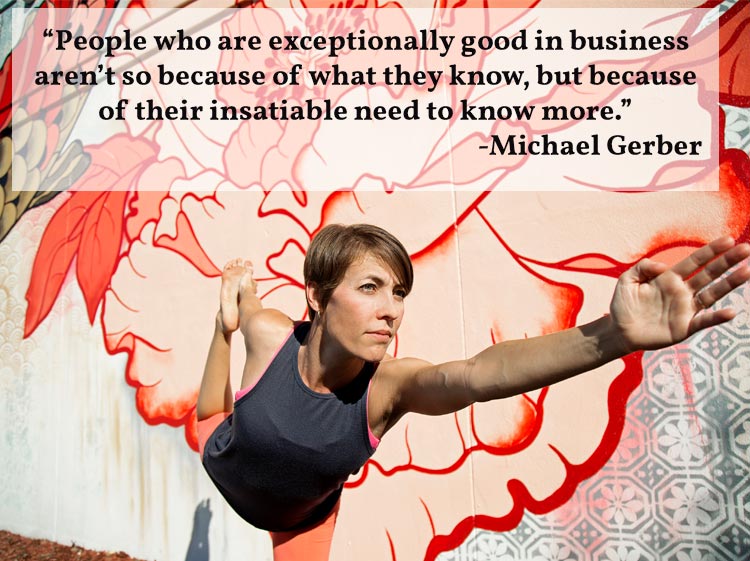
Photo Credit: Ember and Earth Photography
WHY BUSINESSES FAIL
Statistics are often used to collect relevant data, discover problems, and find solutions. Consider some of the following stats about small business in the United States:
- 1 million people start a business each year
- 40% of those businesses will close by the end of that first year
- Within 5 years, 80% of them will have failed
- Of that 20% that surpass the 5-year mark, 80% of those will close by year 10
When I first heard this, it scared me. But instead of running, I sought to understand why this happens.
Many new business owners start out excited and passionate about the work they do. But they make the fatal mistake in thinking that their technical skills alone, like teaching yoga, will help them run a business. They dive in energetically but soon encounter fear of being in over their head and exhausted at working too hard for too little pay. Burnout can hit hard, and you can lose a passion for teaching as well as a sense of direction for your life.
Again, I share this information to provide a warning about what can happen to those who step into running a yoga business without the 3 essential skill sets necessary to do it well. These skills are not hard or complicated. But they do require focus and dedication. And when you understand their power, you can create an exciting, extraordinary, and meaningful yoga career.
SKILL SET 1: HOW TO TEACH
The first skill set you want to master is what seems the most obvious–the technical skills of teaching yoga. Without this, you will not have a great product to offer and you likely won’t stay in business long anyway. Many technical skills are covered at an initial 200-hour yoga teacher training program, including:
- Taking physical assessments of new clients
- Formulating class sequences
- Leading individuals or groups with clear verbal cues
- Adjusting strategically and without risk of injury, and
- Managing time wisely (like starting and ending a class on time)
Being immersed in the daily aspect of doing this work–of teaching and working with clients–is another great way to continue this education. I’m often deemed “the prop queen” because I’ve experienced physical limitations in my past and have worked with other athletes who are the same. Thus, I modify, modify, and modify for each of my clients. This learning was acquired in a hands-on fashion.
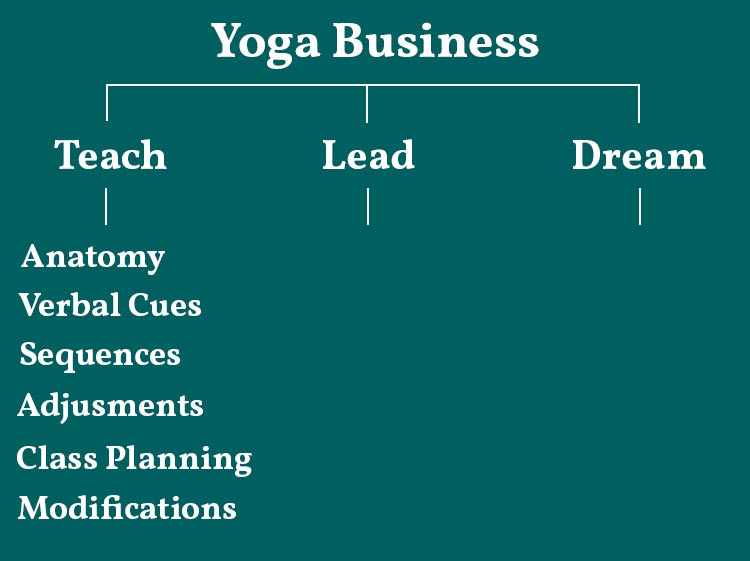
HOW TO BUILD YOUR TECHNICAL SKILLS
In addition to working with clients and teaching groups on a regular basis, here are some additional ways:
- Take classes from other teachers
- Attend a weekend workshop
- Deepen your knowledge of anatomy
- Travel and explore other yoga communities
- Attend a retreat
- Pick a topic that interests you and learn more about the topic (with books, lectures, etc)
Perhaps most importantly, stay on your mat and sustain a personal practice!
“The primary purpose of your business is to serve your life. Once you know this, you can then go to work on your business, rather than in it, with a full understanding of why it’s absolutely necessary for you to do so.” -Michael Gerber
SKILL SET 2: HOW TO MANAGE
While the yoga teacher in you might want to simply teach and refrain from being tied to a system, skills of a manager actually help you become more efficient over time. Managers are often practical. They think in logical ways, foresee problems in the future, and help teams work cohesively to accomplish a common goal.
You might not need to hire a manager for your yoga business. In fact, it’s likely that you will just need to wear a managerial hat at times. In order to do so, you’ll want to buff up on your ability to:
- Plan ahead
- Think long-range
- Decide which steps need to be taken to grow your business
- Reflect on the past to understand weaknesses
- Create order in your daily activities
- Use systems and technology to stay relevant and competent in the yoga industry
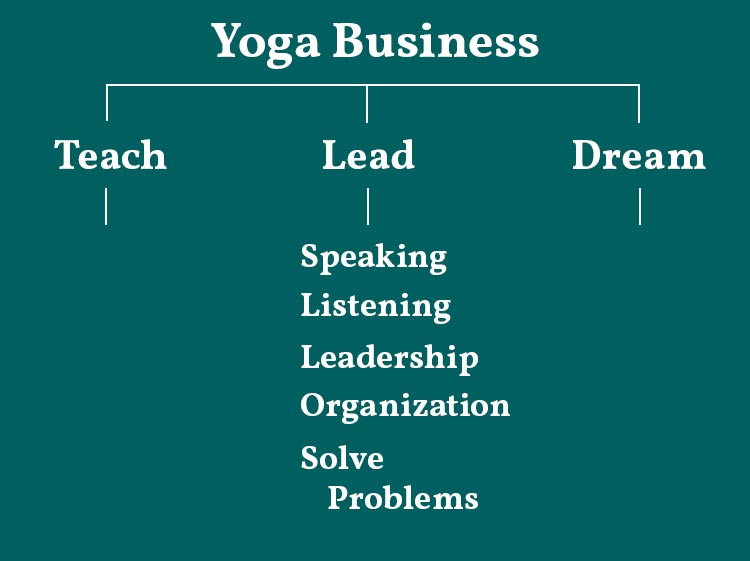
LEAD YOUR BUSINESS CONFIDENTLY
Instead of being stuck in your ways, here are some tips on how you can manage and operate with confidence:
- Improve your speaking skills
- Master the art of asking questions and listening
- Define your values
- Read books on leadership (like The Captain Class, The Advantage, Dare to lead or Powerful)
- Interview other small business owners yourself. Learn what strategies make them more efficient.
One final tip: Refine your business often
As a project manager, I filled out a Google survey once a week to summarize successes and failures in my position. This simple task helped me uncover problems as they arose. And, I could find solutions in a timely manner, instead of waiting six months down the road (when things would have likely gotten worse).
You could do the same in your yoga business. Put in place a weekly review for yourself or your team. Again, it only has to take a few minutes to fill out. If weekly is too often, then consider a monthly, quarterly, and annual review of your processes. Just realize that you’re bound to improve by looking at the scorecard of your business on a regular basis!
SKILL SET 3: HOW TO DREAM
Running a successful yoga business would not be possible without the dream of an entrepreneur. It’s the visionary in you that decided to take the risk. It’s the part of you that sees the big picture and dreams up amazing components for your life.
At their best, an entrepreneur:
- Lives in the future
- Innovates
- Creates strategies and methods for reaching new people
- Refines and improves how you serve your existing community
- Looks for possibilities instead of problems, and
- Creates ideas for manager and teacher to follow
The skills to manage and teach actually help balance these lofty dreams and make them a do-able reality.
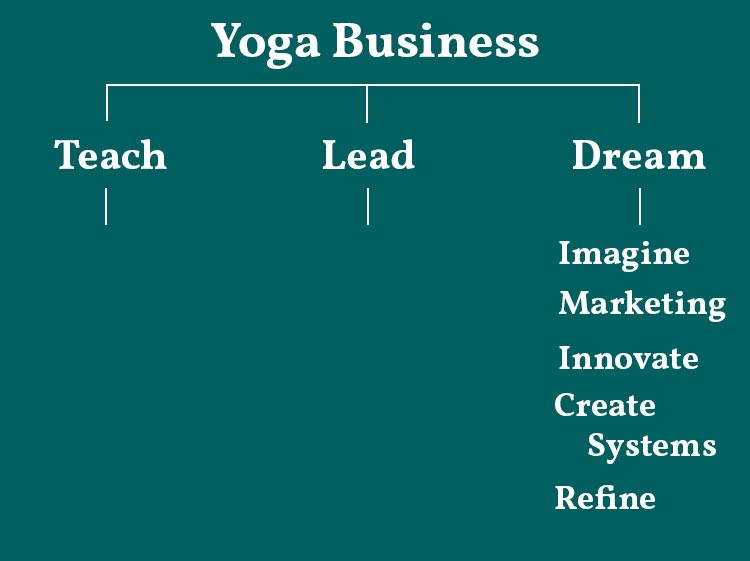
WAYS TO KEEP DREAMING BIG
This natural desire for freedom, to be your own boss, to run your life on your terms can come naturally. It might be the reason you sought out a yoga teacher training in the first place. While you might tend to have natural visionary traits, there are things you can do to develop this essential skill to keep your yoga business moving:
Start with maturity in mind
Think about the business you would like to look like in 5 or 10 years. Then set those practices into motion today (or at least start working in that direction).
Utilize online business resources
While we provide numerous articles to run your yoga business here on Swagtail, there are fantastic business books and business blogs that can also help you expand your skill set.
Work ON your business weekly
The technical skills are focused in the present moment, and it’s easy to get caught up in the day-to-day work of teaching yoga. Yet, if you are always working IN your business, you forget the future to which you’re heading. Instead, take time to work ON your business. This means crafting game plans, marketing strategies, calendars to bring all aspects of you (and your team, if you have one) on to the same page.
To work on your business, ask yourself:
- How does my business work?
- Who is the customer I am serving?
- What outside results do I want to produce?
- In what ways can we reach new people?
If you are unsure how to work ON your business, get a mentor. Even if you have a strong handle on your entrepreneurial skills, it helps to bounce ideas off of other small business owners. For example, when I first started Swagtail, I knew my yoga teaching and writing skills were strong. But I wasn’t sure how to put my ideas into a profitable online business. In my first year, I worked with a seasoned blogger to set a reasonable course for my future. And, as my business is evolving, I continually work with her and other professionals to reach my continually-growing goals.
PUTTING IT TOGETHER
The unique skills and passions you have for yoga drive your yoga business. You invested time, energy, and resources to learn the technical skills required to be a yoga teacher. That certification is just the beginning of your business, though. The next step is to build other essential skills that will help you thrive in the long run. This includes creating and refining the vision for your future, creating systems that will increase your efficiency and dependability. And, as always, you will continue to hone your skills as a yoga teacher in order to provide the best services possible to your community.
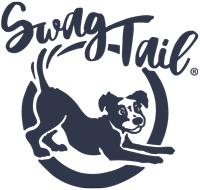











Leave A Comment